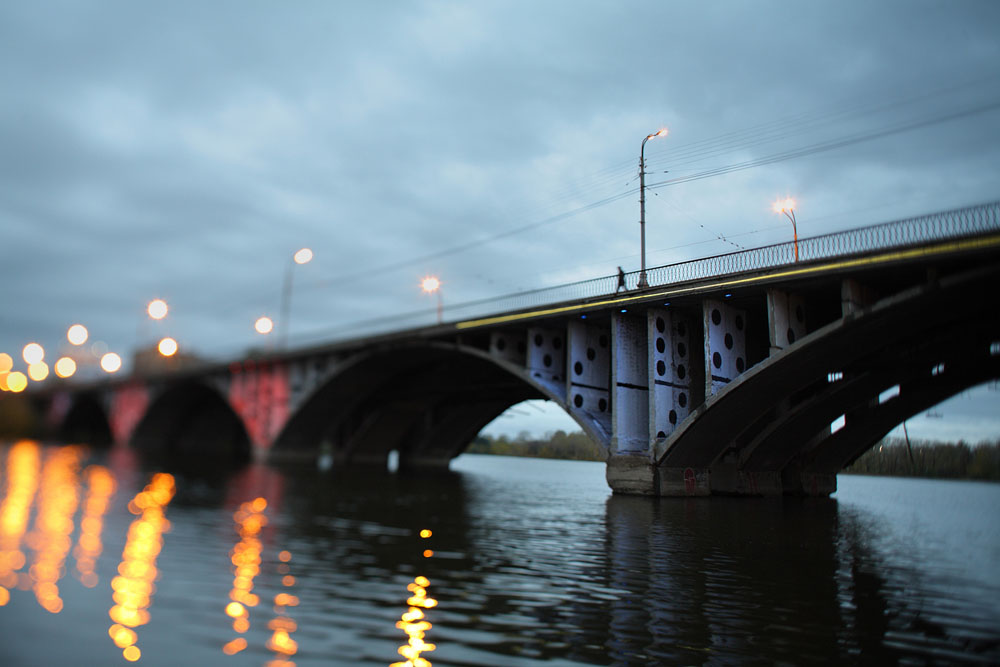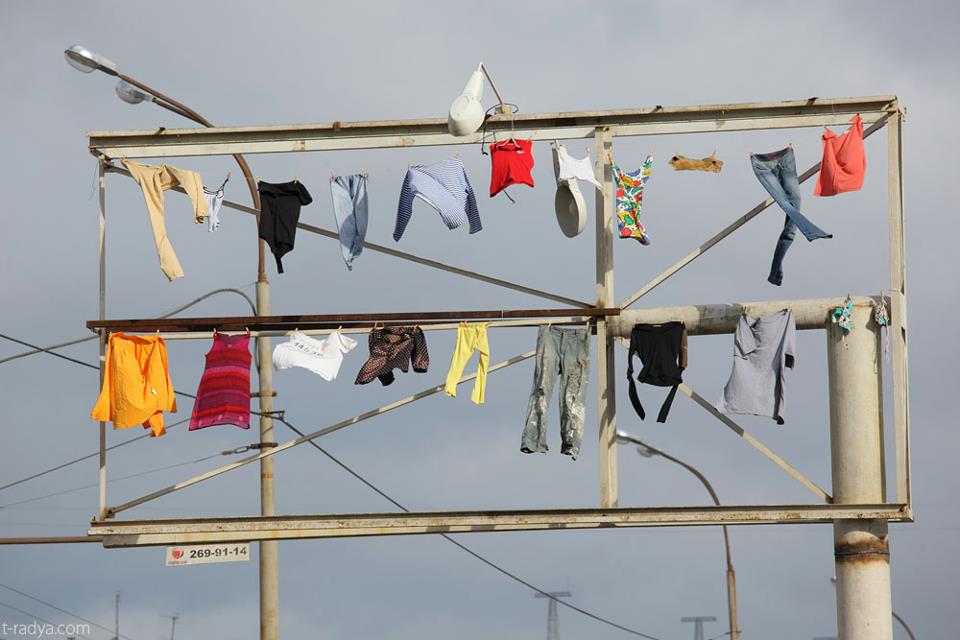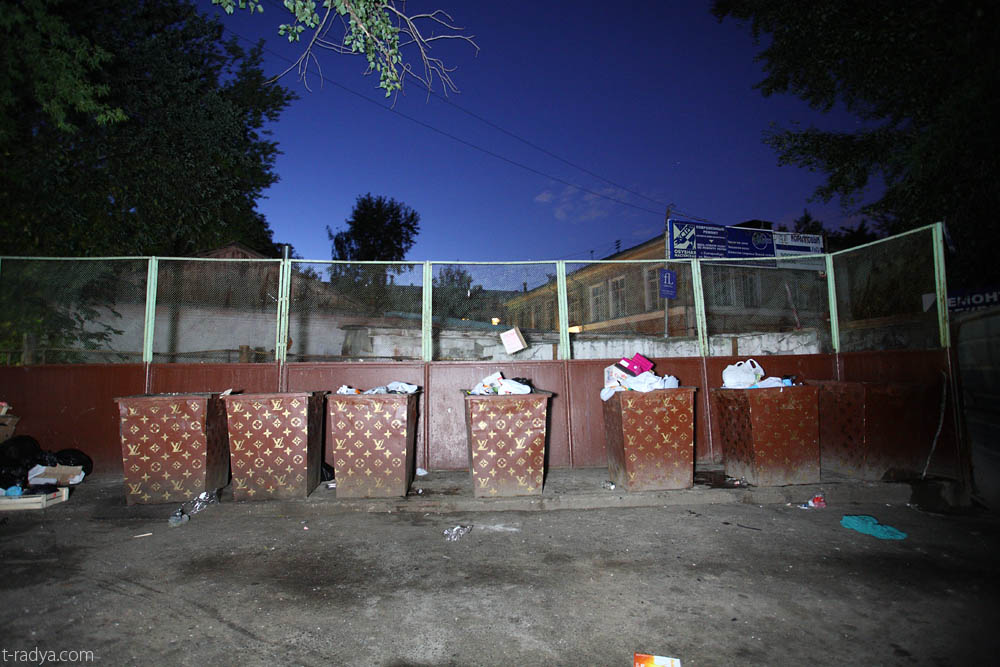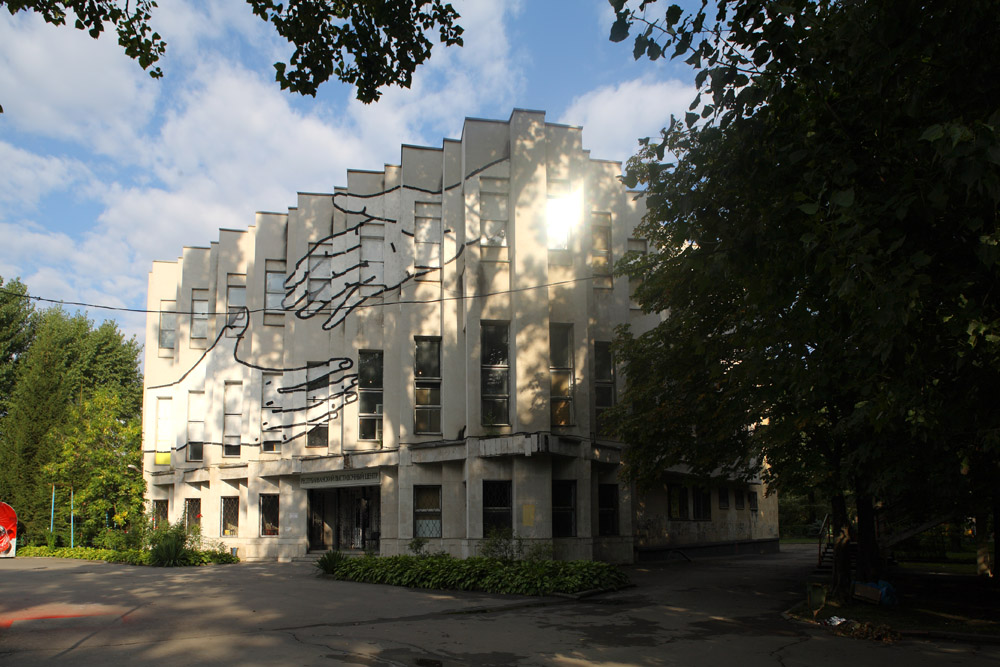Today we’re chatting with Tima Radya, a street artist from Yekaterinburg, Russia. We talk about his love for street art and the challenges he faces as a street artist in Russia.
Today’s musical segments feature the talents of NYC cellist Jacob Cohen and rockettothesky.

Your Move, 2010.
So what drew you to street art?
Radya: I usually have some long answers to this question but in general I just love street art … the rest can be seen in my work.
When did you decide to start doing street art?
Radya: It was three years ago. I remember it was [a] strong influence from Banksy and from my philosophical faculty so this mix turned me on and … it doesn’t seem to stop.

Clothesline, 2012
How does street art fit in with your philosophy?
Radya: For me, the main part in street art is in ideas, not its form. And all my ideas are from my courses and these books. I think philosophy is good for all artists. Not only street art artists.
Did you go to art school?
Radya: No.
So you’re self-taught?
Radya: I think yes. And I have a lot of friends who can draw and paint things.

So is there a lot of street art in Russia?
Radya: Yes. Street art is alright here and there is more freedom here than in Europe or in the U.S. And for me, this is a strong catalyst. Imagine that you can do whatever you want. In such a situation, you need a good understanding of why you work. Why you are doing this … and this is incredibly interesting and exciting for me.
Who are some Russian artists creating inspiring work?
Radya: My favorite artists [are] P183… and Nomerz. All these guys are young and they are from different cities in Russia and we’re friends.
Do you ever collaborate with them?
Radya: Sometimes but not in general.
What are some themes you explore with your work?
Radya: I don’t have some specific topics that I like to talk about, but I can say there are two main directions for me.
One – things [that are] more political; they work as a [hammer]. And second is wonderful things and they work as mirror. I want to mix these directions to make beautiful things more complex and [the] political — deeper, maybe more existential. Generally the words that I say will not be enough. I talk when there are projects.
Can you give me an example of a work that you did that mixed something political with something beautiful?
Radya: In general, it’s possible to find these aspects in all projects. But I think [a] good example is Eternal Fire project and maybe our last piece, Stability, is an interesting example too. It’s not beautiful … directly, but it’s interesting as a piece of art, not only a political action. I think it was a good performance.
Eternal Flame
Do you have the freedom to perform any piece spontaneously in Russia?
Radya: I think yes. It’s possible. Even such extreme things like Pussy Riot …
But even Pussy Riot went to jail so —
Radya: Yes, but this piece was done. Jail is another aspect.
Stability
So what challenges do you face as an artist in Russia?
Radya: Good question.
Translator: My difficulty is not in some kind of relationship with other people but in my own decision – whether I have to do it or not, whether I should do it or not.
So do you ever get scared?
Radya: Every evening, and I think it’s [the] right situation. It’s a healthy situation when you are afraid of something.
How do you feel after it’s done?
Radya: It’s a very specific feeling. I’m always surprised because I can’t realize … I can never imagine how it would look and then – I can and it’s very interesting because on street it’s hard to do what you want. [You] have so many problems with [the] environment, police, people … all these things.

If you were to get caught painting a building or something what would happen?
Radya: It depends on building of course, but mostly I think nothing. Maybe you must pay money but no jail for this type of crime. It’s not [a] serious crime here if you paint not-political piece.
So if it’s political it might be more serious?
Radya: Yes, but it depends on local government and in our region, we have a good tradition. It’s possible to do political pieces here.
Where do you think they would be more strict about political pieces?
Radya: It’s impossible in Caucasus, really. It will be [a] terrible problem for you in Caucasus, and I think in Moscow it’s difficult because of media attention to you, like an example, of Pussy Riot.
Where would you like to take your work in the future?
Radya: My main goal is space. It would be nice to do some work on a rocket, but it’s difficult. Maybe we can discuss this with NASA.

